新湖畔网 (随信APP) | 星巴克在中国的7300多家店都有云南咖啡!我在普洱亲眼见证中国咖啡走向世界的12年。

文章目录[隐藏]
新湖畔网 (随信APP) | 星巴克在中国的7300多家店都有云南咖啡!我在普洱亲眼见证中国咖啡走向世界的12年。
【微信/公众号/视频号/抖音/小红书/快手/bilibili/微博/知乎/今日头条同步报道】
提到云南普洱,这个中国西南边陲的小城,很多年来都是以世界茶乡而闻名,这里是世界上最早种茶、制茶、饮茶、卖茶的地方。
但今天很多人和普洱的连接,却是从一杯咖啡开始。
最近星巴克在普洱举办的咖农上宣布,云南产的咖啡豆将已经在中国内地 7300 多家门店的经典浓缩中加入,云南单一原产地咖啡豆也将都会在门店里销售。
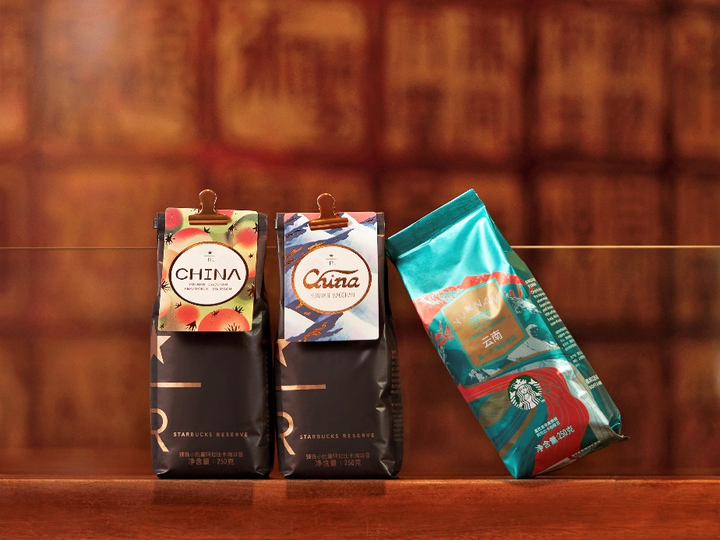
云南咖啡的种植历史可以追溯到 1904 年,法国传教士田德能在云南大理朱苦拉传教期间,种下了中国大陆第一棵咖啡树。
不过此后百年间云南咖啡都在野蛮生长,从种植到加工、烘焙技术都十分粗糙,并没有如同茶叶发展成为成熟的产业链。
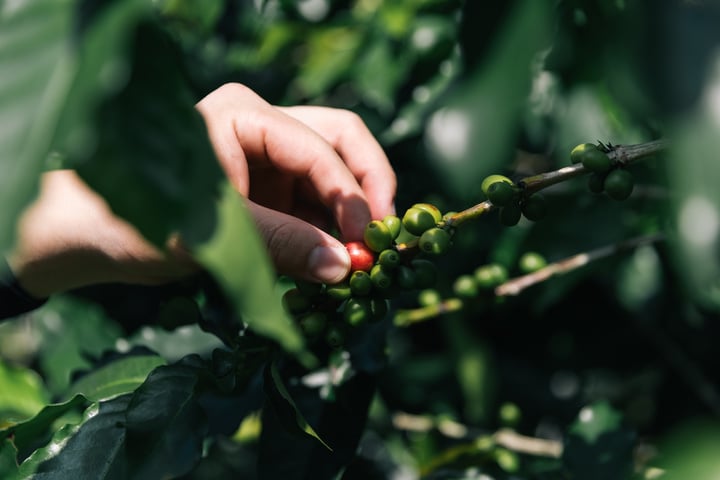
虽然西南联大时期咖啡馆也成为昆明文人学者的社交场所,沈从文也会用云南产的阿拉比卡种咖啡豆招待过胡适。但云南咖啡在世界上被认为是低价低质的产品,收购价几乎是全球最低。
而变化过去十多年骤然加快,现在云南咖啡已经成为中国最大的咖啡产区,种植面积和产量均居全国首位。成为中国在第三波咖啡浪潮中的重要角色。
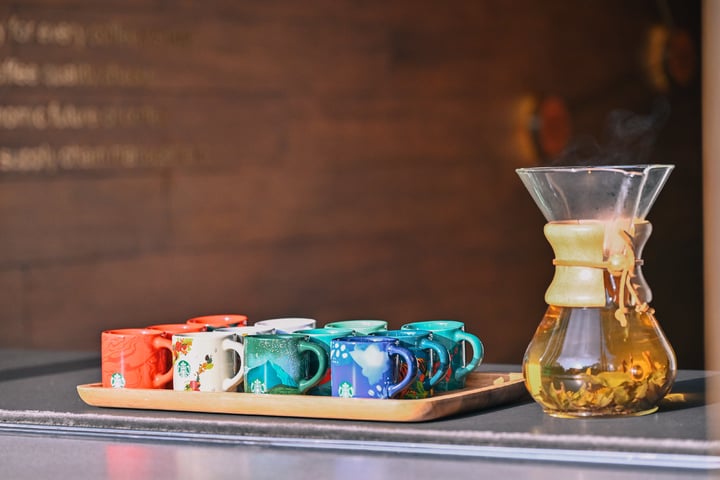
据统计,过去 12 年,星巴克累计从云南采购了超过 65000 吨优质咖啡。我们也来到了普洱的咖啡种植地,与一株株咖啡豆背后的人聊了聊,看看他们怎么一点点改变了云南咖啡。
蔡晴开:从货车司机到星巴克臻选
从距离云南普洱 80 公里的那澜村出发,车子沿着蜿蜒的盘山公路一路颠簸上行。
茫茫青山层叠起伏,绿色的山峦延伸至视线尽头,白色的云海仿佛棉花糖般在山间翻滚起伏,我们来到海拔 1200 米的高山之上的晴开农场。
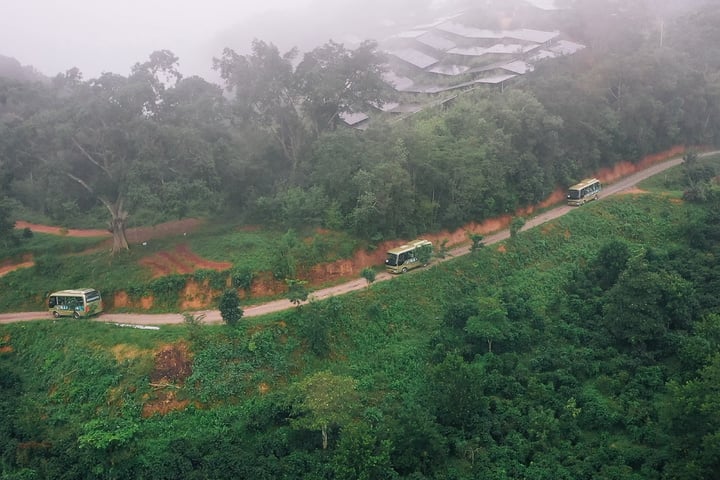
刚到达就看到一个皮肤黝黑的咖农正在为到访的客人手冲咖啡,他就是农场的主人蔡晴开。
这是我第一次来到普洱咖啡原产地,但却不是第一次品尝蔡晴开的咖啡。早在 2019 年,星巴克臻选就推出了晴开农场咖啡豆,这也是第一款以咖农名字命名的咖啡豆。
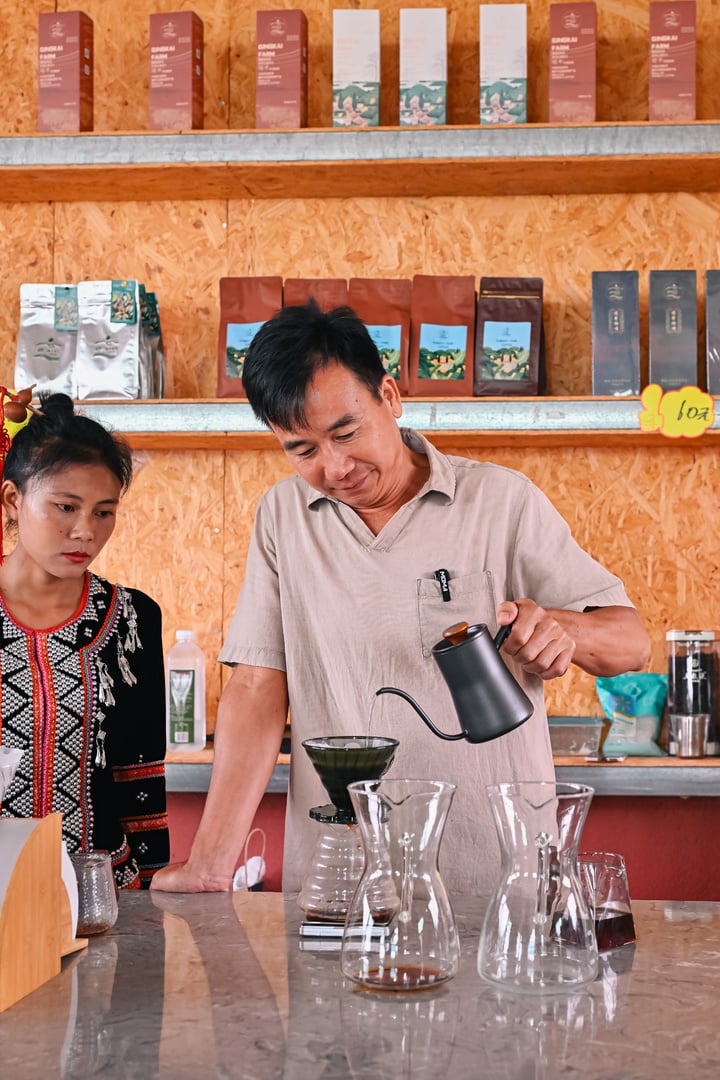
或许很难想象,多次入选星巴克臻选的蔡晴开,十多年前还是专跑长途的卡车司机,常常一天要开上百公里,经常在赶路时泡上一杯速溶咖啡提神,这却是他和咖啡缘分的开始。
后来...
英文版:
When you mention Pu'er in Yunnan, this small town on the southwestern edge of China has been famous for its tea culture for many years. It is the birthplace of planting, producing, drinking, and selling tea in the world.
But today, many people's connection to Pu'er starts with a cup of coffee.
Recently, at the Starbucks Coffee Farmers Summit in Pu'er, it was announced that Yunnan-produced coffee beans will be included in the classic espresso drinks served at over 7300 Starbucks stores in mainland China, and Yunnan single-origin coffee beans will also be sold in stores.

The history of coffee planting in Yunnan can be traced back to 1904, when French missionary Trandene planted the first coffee tree on the Chinese mainland during his missionary period in Zhukula, Dali, Yunnan.
However, over the past century, Yunnan coffee has been growing wild, with very rough cultivation, processing, and roasting techniques, and has not developed into a mature industry chain like tea.

Although coffee shops have also become social places for literati and scholars in Kunming during the Southwest United University period, Shen Congwen also treated Hu Shi with Yunnan-grown Arabica coffee beans. But Yunnan coffee is considered a low-price, low-quality product in the world, with purchase prices being among the lowest globally.
However, in the past decade, the change has accelerated significantly. Now, Yunnan coffee has become the largest coffee-producing region in China, ranking first in both planting area and yield, becoming an important player in China's third wave coffee movement.

According to statistics, Starbucks has purchased over 65,000 tons of high-quality coffee from Yunnan in the past 12 years. We also visited the coffee planting area in Pu'er and chatted with the people behind each coffee bean to see how they have gradually changed Yunnan coffee.
Cai Qingkai: From Truck Driver to Starbucks Reserve
Starting from Nalan Village 80 kilometers from Pu'er, the car bumps along a winding mountain road.
The vast green mountains undulate, extending into the distance, and the white sea of clouds rolls like cotton candy in the mountains. We arrived at Qingkai Farm on a mountain 1200 meters above sea level.

As soon as we arrived, we saw a dark-skinned coffee farmer hand-brewing coffee for visiting guests, he is the owner of the farm, Cai Qingkai.
This is my first time in the birthplace of Pu'er coffee, but not the first time tasting Cai Qingkai's coffee. Back in 2019, Starbucks Reserve introduced the Qingkai Farm coffee beans, the first coffee beans named after a coffee farmer.

▲ Cai Qingkai brewing coffee.
It may be hard to imagine that Cai Qingkai, who has been selected for Starbucks Reserve multiple times, was a long-distance truck driver over a decade ago. Often driving hundreds of kilometers a day, he used to brew instant coffee to stay awake while on the road, but that was the start of his coffee journey.
Later, Cai Qingkai grew tired of driving long-haul trucks and, after seeing his uncle's coffee plantation, the idea of growing coffee sprouted in his mind. He quickly decided to sell his house and purchased a hectare of land in Pu'er to plant coffee.
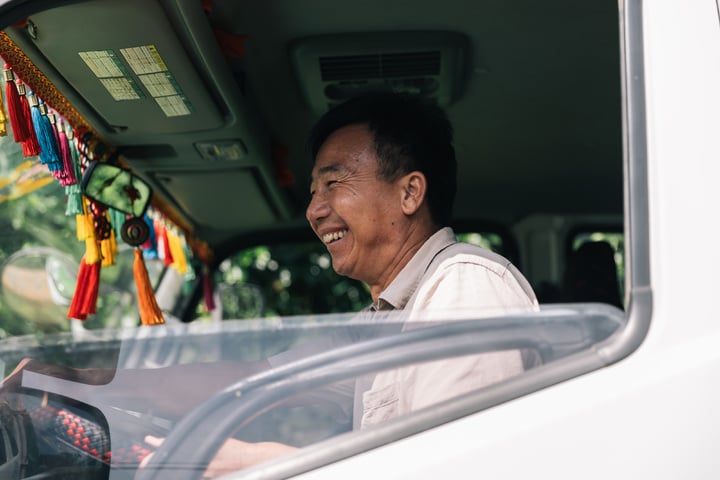
Planting coffee was not as easy as he imagined, as it takes three years for the coffee to mature from planting. For Cai Qingkai, it was a hundred times more bitter than a strong, Italian espresso, even living with his wife in a truck on the mountainside.
In 2012, he learned that a company called Starbucks had established a "Coffee Growers Support Center" in Yunnan, offering free planting knowledge to coffee farmers, providing help and guidance in the coffee fields, and offering higher purchase prices for high-quality coffee beans. This motivated Cai Qingkai to plant high-quality coffee.
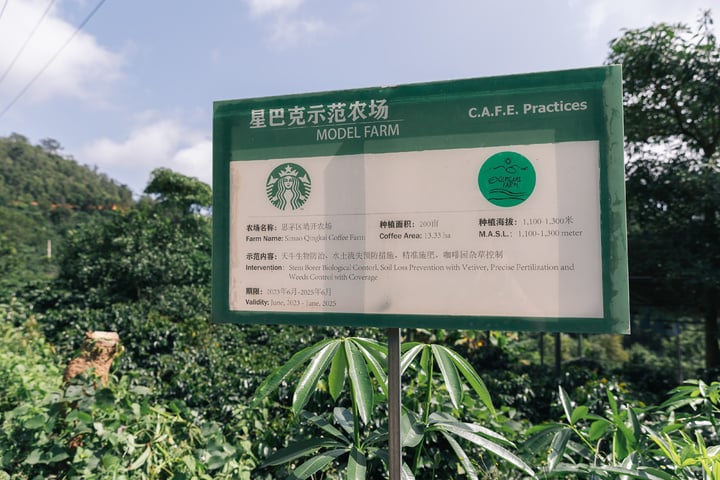
Cai Qingkai told Playplore that his coffee beans are mostly pesticide-free. He plants crops like pineapples above the coffee trees to block excessive sunlight.
To address the impact of continuous rainy weather on coffee flavor in the area, Cai Qingkai spent two years continuously testing and developing the "Golden Robe Processing Method," and has shared this innovative coffee process with more local coffee farmers.
This method was initially an attempt to adapt to local conditions, and unexpectedly, it brought about unique flavor performance.
Cai Qingkai has established a coffee cooperative for about two to three hundred local farmers, and besides coffee cultivation, he plans to gather various industries such as tourism for industrial upgrading.
He told us that his biggest wish now is not just to sell his coffee beans at a better price, but to work with many other coffee farmers to promote Yunnan coffee and receive recognition.
Ma Xiaojin: Growing Specialty Coffee on Ailao Mountain
Since National Day, the Ailao Mountain, known as the "Forest of Death," has suddenly become popular, attracting many adventurers.
The Ailao Mountain Range is located at the junction of the Qinghai-Tibet Plateau, the Hengduan Mountains, and the Yunnan-Guizhou Plateau, stretching about 500 kilometers, also crossing over Pu'er.
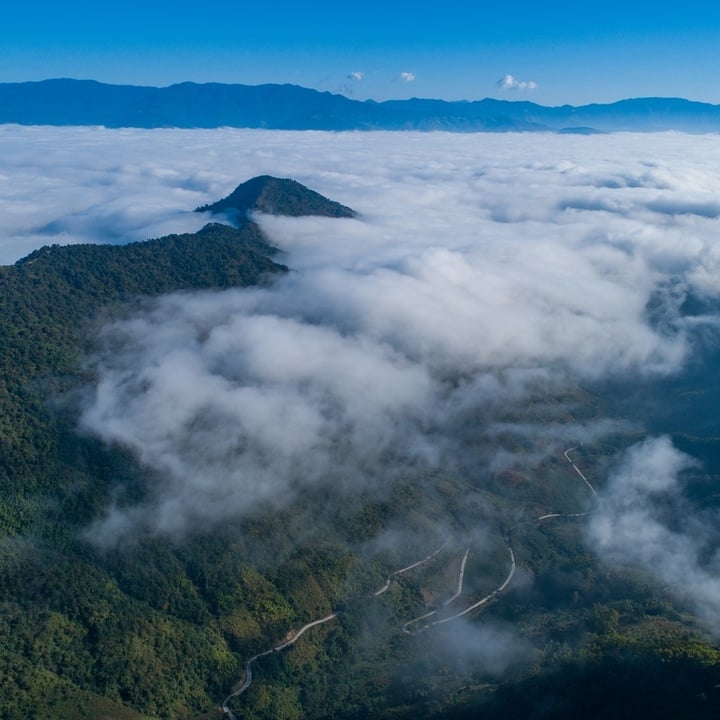
If you manage to climb Ailao Mountain to an altitude of 2000 meters, you may see coffee beans covering the mountains, Ma Xiaojin being one of the coffee farmers on Yunnan's Ailao Mountain.
Although the climate at the junction of the Yungui Plateau and the Hengduan Mountains is gentle and rich in precipitation, perfect for coffee growth, planting coffee in Ailao Mountain is not easy. The high-altitude area has variable weather, large day-night temperature differences, and overcoming the risk of low-temperature frost in the high-altitude area to ensure that coffee trees can safely overwinter in winter.
Many people initially advised against Ma Xiaojin taking this risk, but he always had a dream of planting high-quality coffee.
I don't believe that none of the more than ten varieties I planted will be resistant to the cold.
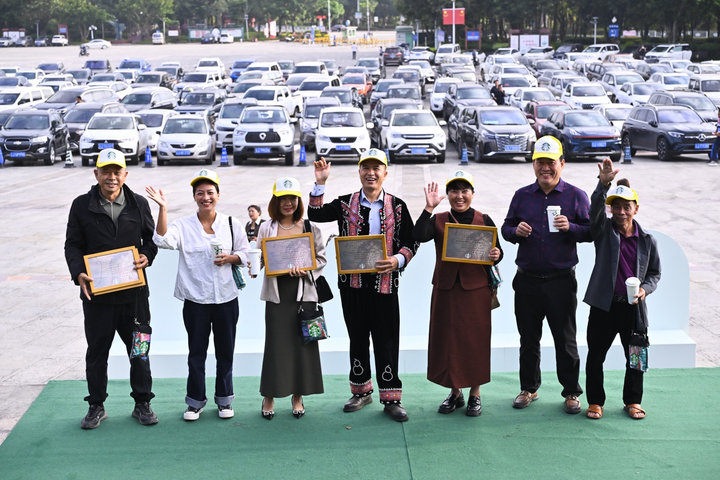
▲ Ma Xiaojin attending a coffee farmers' conference.
When Ma Xiaojin spoke to us, he couldn't help but show a proud expression. His coffee beans not only selected as Starbucks Reserve coffee beans, but also scored high in international professional coffee tasting evaluations, and even received comments like "can be compared to Blue Mountain coffee."
This is my dream. I've always loved coffee and hoped to grow the best coffee, so I need to keep trying.
The New Generation of Coffee Farmers
In conversations with older generation coffee farmers, we can feel the hardships of coffee planting, and even with more advanced planting techniques, it is still not easy. In the past, most coffee farmers were not willing for the next generation to continue in this industry, but things are changing now.
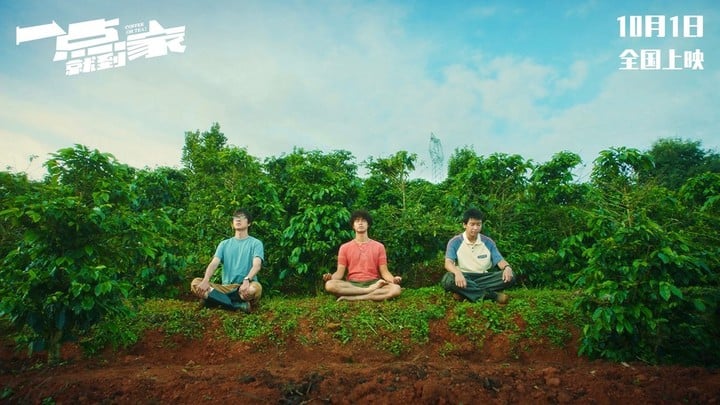
▲ The movie "One Step Home" also tells the story of a group of young people engaged in the coffee industry in Yunnan.
Liu Xiaorong, a graduate of Yunnan Arts University, decided to return to the coffee industry after working for a while after graduation. It was not easy initially, as a young girl in her early twenties working under the scorching sun on the farm, this transition was not so easy.
After Liu Xiaorong and her husband took over the coffee industry from the previous generation, they brought new changes. They now cover the entire coffee production and quality chain, managing over 600 acres of coffee plantations, and gradually establishing production and quality standards for coffee beans through collaboration with Starbucks.
Liu Xiaorong and her husband's coffee beans have also passed Starbucks' "Coffee and Farming Equity Practices (C.A.F.E. Practices) certification. Their coffee bean supply to Starbucks has increased from tens of thousands of kilograms five years ago to 120,000 kilograms now, and they also supply to Nestle and bulk trading companies in Kunming.
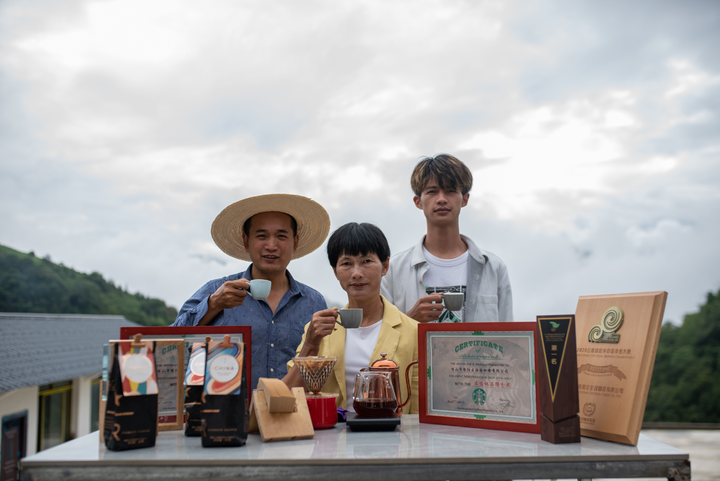
▲ Fan Qizuo.
Similarly, the third-generation coffee family Fan Qizuo now has a successor.
Starting in 1982, this "Coffee Family" that started growing coffee, went from not drinking their own coffee to growing Starbucks Reserve coffee beans. This achievement has also inspired Fan Qizuo's son, Fan Wenhao.
Fan Wenhao believes that it is very remarkable that his father was able to turn his hobby into a business, and he once joined Starbucks as a barista. Now he has returned to his father's side and
星巴克中国 7300 多门店都有云南咖啡了,我在普洱看到了中国咖啡走向世界的 12 年
#星巴克中国 #多门店都有云南咖啡了我在普洱看到了中国咖啡走向世界的 #年
关注流程:打开随信App→搜索新湖畔网随信号:973641 →订阅即可!
公众号:新湖畔网 抖音:新湖畔网
视频号:新湖畔网 快手:新湖畔网
小红书:新湖畔网 随信:新湖畔网
百家号:新湖畔网 B站:新湖畔网
知乎:新湖畔网 微博:新湖畔网
UC头条:新湖畔网 搜狐号:新湖畔网
趣头条:新湖畔网 虎嗅:新湖畔网
腾讯新闻:新湖畔网 网易号:新湖畔网
36氪:新湖畔网 钛媒体:新湖畔网
今日头条:新湖畔网 西瓜视频:新湖畔网



